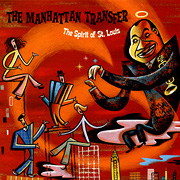
The Spirit of St Louis
The Manhattan Transfer
2000: Atlantic 83394-2
In a recent comment on another Manhattan Transfer album, I mentioned in passing that I wasn’t particularly an MT fan. Later that night I got to thinking about why it was that I wasn’t, and I concluded that it was because I hadn’t paid any attention to their output after Brasil (which I think had found its way onto my radar by accident in the first place). I took an unhurried reading tour through the assessments of their output at www.allmusic.com and found that I was ridiculously out of touch with what they’ve been up to since then, and I took note of the range of appraisals and promptly ordered copies of their three most recent studio albums, this one included.
Although Richard Ginell’s review of this album, which is a tribute to Louis Armstrong (hence the title), had me at least braced for a departure from the MT’s usual sound and into strange depths and unknowns, I was still simultaneously startled, disoriented, and thrilled by what hit me right off the bat here. Not every track is as bewilderingly unparalleled and ever-so-slightly-weird as “Stompin’ At Mahogany Hall” is here, but the sonic staging throughout the album is always worked masterfully but in different ways for each track. Hearing it on headphones is especially effective: you get not a smooth stereo landscape but a stereophonic placement of individual elements of the overall sound, each with its own special presence (reverb, no reverb, immediacy, scratchiness, monaural-grouping, techno-tinged roboticism, etc.), and the overall effect is absolutely arresting.
Meanwhile, of course, somewhere amid all that production artistry, there’s those VOCALS, and those brilliant arrangements. In that sense the big surprise here is that some of the songs go on far longer than you expect they will do, “The Blues Are Brewin’” being probably the most extreme example, clocking in at over 6 minutes when it could have just succinctly ended around the 4-minute mark; the continuation isn’t a drawback or liability, not in the least…if anything it’s like discovering your CD has the Special Secret Extended Full-Jam-Session recording that nobody else gets to hear.
Throughout this journey there’s little sonic nuances that heighten my appreciation for what’s presented…here a snippet of an outtake laugh, there a juxtaposition of reverbed percussion and dry vocal tracks…. And then there’s the stylish use of almost-cloyingly smarmy older songs draped heavily over sampled-and-programmed structures, with the end result transcending its elements and far more. And there’s quite a sprinkling of Django Reinhardt in the strumming and plucking throughout, which of course brings a special suitcaseful of its own magic and connotation to whatever’s being sung on top of it (or, in this record’s quirky context, *beside* it).
I also love the effusive playfulness with which they approach so much of their musical heritage: “Old Man Mose” is a great example, as we get catapulted back into a wild 1930s standard hugely infused with nearly-as-wild 2000s energy (spiced by Tim Hauser’s verbal additions, a couple of which still make me giggle like I did upon first hearing them) but left untranslated into our current context. The gentler tracks are delivered with amazingly sultry indulgence, so intimate-sounding that listening to them feels like eavesdropping on lovers’ cooings at a cozy restaurant. Oh, and then there’s “Gone Fishin’,” which is a cute remake/tribute to the 1951 Louis Armstrong/Bing Crosby duet but with the interjected remarks updated to be in Tim Hauser’s and Alan Paul’s own vernacular…which includes what is for me the laugh-out-loud moment of the album, when the lyric “There’s a hoe out in the sun” gets double-entendre power thanks to the listener not necessarily realizing that there’s an E at the end of “hoe,” hence Hauser’s raised-eyebrow, half-laughing response “I beg your pardon?”
All in all, this baby kicks some completely unprecedented ass. On top of all this, each of the singers sounds as gorgeous as ever (if not more so) both in solos and tout ensemble. I wished I could have had another full album’s worth of tracks handled this way, but sustaining a good thing isn’t necessarily the way to get more of it, and thus I drop the demand and bow with gratitude to the Manhattan Transfer and those who created this album’s sound, and I say Thank You for a glorious and nearly unforeseen trip.
Comments © 2005 Mark Ellis Walker, except as noted, and no claim is made to the images and quoted lyrics.